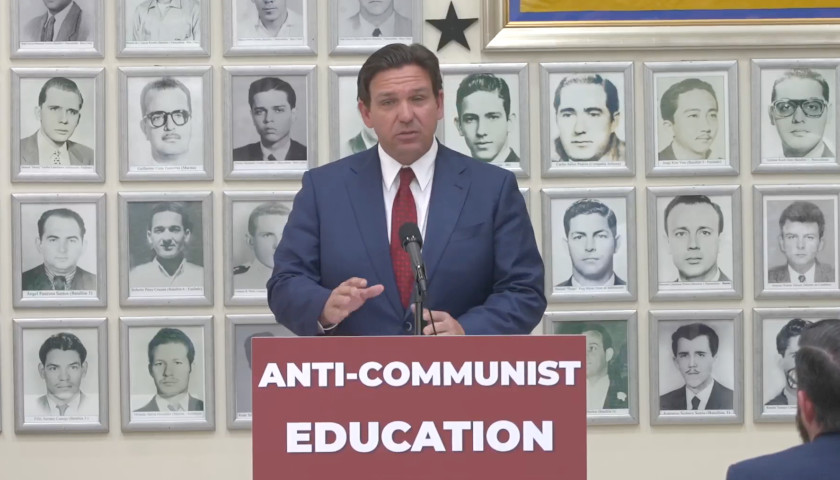Members of the Brookings Institution said in an article late last week that local policymakers in Nashville should restore North Nashville’s black middle class — by pursuing a reparations policy.
According to its website, the Brookings Institution is a Washington, D.C.-based nonprofit.
Senior Fellow Andre M. Perry (pictured above) and Research Intern Anthony Barr said in their article that the North Nashville area, specifically in and around Jefferson Street, “was once a booming hub for the city’s Black middle class.” But in the 1960s, they went on to say, city planners — allegedly practicing “systemic racism” — put Interstate-40 through that area of the city, thus hurting its commercial corridor as well as hurting business owners and residents. And now North Nashville “is one of the most economically precarious locations in the metropolitan area” and has a high incarceration rate.
“The reality is that hurting communities cannot ‘nonprofit’ their way out of poverty—services that don’t address market failures and structural racism will have limited impact. This is especially true when these communities have suffered historic injustices,” Perry and Barr wrote.
“The entrenched poverty and poor economic conditions in North Nashville are the direct result of racial injustices tied to the construction of I-40, and the destruction of Black communities that followed. Decades of disinvestment and neglect worsened these economic conditions—something the standard development playbook cannot ameliorate. Restoring North Nashville’s Black middle class will require more than tax abatements and flashy development projects. If state and local policymakers are serious about revitalizing these communities, they need to pursue local reparations policies.”
Perry and Barr wrote that members of the Metro Nashville Council last year published a report on ways to help North Nashville. Council members suggested ways that they said would reduce incarceration and increase economic mobility.
Perry and Barr said local reparations aren’t a substitute for state and federal reparations.
“But these local policies do matter, and they can help to rectify harm in ways that improve upon the more generalized development mechanisms that lack hard metrics and often lead to underwhelming results,” Perry and Barr wrote.
– – –
Chris Butler is an investigative journalist at The Tennessee Star. Follow Chris on Facebook. Email tips to [email protected].
Photo “Andre Perry” by The Brookings Institute.









We’re going to pay it. There is no way we’re not going to get away from it. Here is my suggestion:
National Educational Repartitions for Freedmen’s Existing Decedents (NERFED). The name can be changed, as long as the word “freedman” stays in it. If you’re going to bludgeon the American people with slavery, you WILL wear the appropriate title.
Since the original “40 acres and mule” was so that the freedman could provide for himself, let us look to the modern version of “preparing for success” – job training.
Eligibility: Every person born before a certain date (I’m thinking summer 2002) that self-identifies as “black”. We can check to see what they claimed, race-wise, on the Census forms. Persons born after that date MAY be eligible, if neither their parents or grandparents took advantage of the program.
Benefit: What we can do is allow a tax credit equal to money spent for education, be that a practical degree (none of this “African-American Studies” crap), technical school, or “vocational training”. Verification can be done with receipts and educational transcripts. We can set a maximum lifetime amount of $20,000, $30,000, or more. Since the IRS has so little to do, they can keep records of the amount of taxes each claimant has left to be canceled.
The American people, especially the non-black ones, benefit as the money is not coming out of the treasury, but rather it is not being paid in the first place.
The Catches: Firstly, the claimant has to make the effort to better themselves. This isn’t cash being handed out “just because one is black”. That is, they have to pay money out to get an education. Secondly, they have to make money to be taxed upon to claim the benefit.
By 2085, such a program could come to an end, and we can say to the “Black Community”, “We’ve paid. Shut up and go away.”
Reparations paid in American blood. Bill paid in full. Now go get a job.
i well remember april 1968 when this neighborhod was in flames after the assasination of mlk.
i am mad so i gonna go burn down my grandmas house. that is the rest of this story
Does anyone doubt that all the race baiting and CRT stuff is anything more than setting us up to pay reparations? The handwriting is on the wall. Dump enough guilt on the “privileged” whitey and he will pay up.
You are not “special”! Remember that.
Who is going to be responsible for paying this so called reparations ? Of course it will be the taxpayers who had noting to do with what took part prior to 1865. All this is a scam for free money for those who never experienced what a real slaves had to endure. If you want to give reparations to those who’s ancestors were slaves then make those who’s ancestors that held slaves and supported slavery pay after all they are the guilty ones. Isn’t that what this is all about punishing the guilty?
We’ve had reparations for the past 65 years. There has been payments for Dependent Children, Medicaid, checks that we used to call Old Age assistance (for those not qualifying for Medicare), Tax breaks for Head of Household, Black Farmers Assistance, preference in hiring of Blacks & Women, Free Internet service, Free Cell phones, Free school lunches and Breakfasts, Urban renewal, and on and on and on. I say those are reparations enough. As for the black middle class disappearing, so has the rest of middle class. Just look at all the mid-price range automobiles that are no longer made: Plymouth, Pontiac, Oldsmobile, Mercury, Saturn; they all disappeared because the market for them, the middle class, is evaporating.
The Brookings Institute regards themselves as a “think tank”. Try to ponder that with a straight face.
very little thinking going on at these think tanks.
so when is ‘enough enough?’